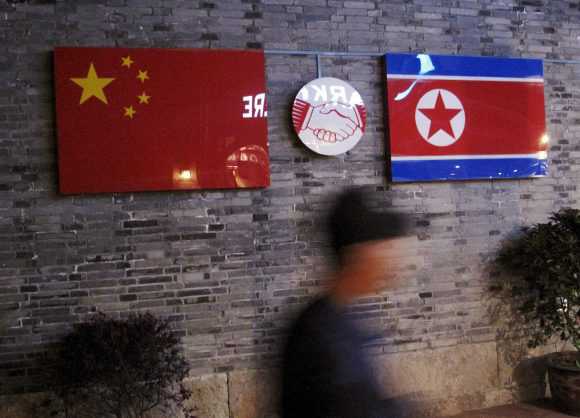Beijing readying for Korea conflict – or merely hedging its bets?
19 January, 2018

There are indications that China’s attitude toward North Korea is shifting: It is no longer rushing to Pyongyang’s defense when the North’s nuclear tests or missile launches are criticized by others, and President Xi Jinping appears to have struck up a relationship with US President Donald Trump.
In addition, academics and other advisors in China are urging the government to consult with Washington in developing contingency plans regarding North Korea and to prepare for war on the Korean Peninsula. That such opinions are expressed at all in Beijing is noteworthy; that they are being published openly in the public arena is remarkable.
The Global Times, a tabloid news outlet connected to the party and often used by Beijing to float ideas and gauge reaction to them, bluntly stated in August last year that “China should make it clear” to North Korea that, should Pyongyang initiate actions that “threaten US soil first” and Washington then retaliates, Beijing would remain neutral.
And it is not just in the media. A report last year from a source inside Northeast China stated that there had been a large movement of Chinese troops to the border with North Korea. Perhaps as many as 30 trucks were observed moving troops towards the area, mostly at night to avoid detection. Another source reported that Beijing had positioned troops all along both the Yalu and Tumen Rivers, the border between the two countries. Chinese residents in the area are said to perceive this as preparation for conflict.
Furthermore, China is also building five refugee camps in its northeast provinces near the border with the North, and for years has been building fences in certain areas, aimed at keeping economic migrants out.
Washington piles on the pressure
US Secretary of State Rex Tillerson recently claimed to have been talking with China about plans regarding what to do if North Korea implodes economically or suffers a coup that results in the collapse of the regime. Although Tillerson said the discussions centered on how to secure the North’s nuclear weapons, he reassured Beijing that the US would do nothing to initiate regime change or collapse.
Moreover, Washington and Beijing appear to have been sharing information on the implementation of sanctions against Pyongyang and intelligence on the North’s nuclear weapons and missile systems. A report of a direct line between the headquarters of US Forces Korea in Seoul and Beijing’s Northern Theater Command in Shenyang being established was refuted by China.
These developments take place against the backdrop of a wide range of joint military exercises between South Korea and the US, including rehearsal of decapitation strikes against the Kim Jong-un regime.
The North is taking note. According to a recent report by the specialist website 38 North, a group of Pyongyang’s foreign ministry officials told a visiting Russian expert on Asian affairs they are fearful that Washington is preparing to strike North Korea first. They cited the drills tailored to eliminate Kim, as well as those intended to take control of nuclear sites in North Korea. The near-constant shows of force by US air and sea power are additional sources of worry since they are perceived as practice for attacking the North.
Double-dealing or double-crossing – what to believe?
China’s statements regarding Pyongyang and its behind-the-scenes actions illustrate changes in how it views its former protégé. At the onset of Chinese intervention in the 1950-53 Korean War, Mao Zedong described Beijing and Pyongyang “as close as lips and teeth.” Subsequently, the 1961 China-North Korea Defense Treaty reflected that, stating “In the event of one of the Contracting Parties being subjected to the armed attack by any state or several states jointly and thus being involved in a state of war, the other Contracting Party shall immediately render military and other assistance by all means at its disposal.”
However, Chinese intervention in support of North Korea is not a given, particularly as recent behavior by North Korea has shown a lack of respect for its patron. Relations between the two countries have degraded since Kim executed his uncle Jang Song-taek in late 2013. Jang was Pyongyang’s point man on Chinese affairs and had cultivated extensive relationships with Chinese officials. As a result, China’s Xi has never met in person with Kim.
Even so, a “Top Secret” memo bearing the seal of the Communist Party of China recently leaked to the Washington Free Beacon, a website specializing in security and intelligence, last year pledged to protect Pyongyang by preventing the collapse of the regime and by defending it against Western aggression. Though denied by Beijing, the document promised “defensive military construction” and “advanced mid- and short-range ballistic missiles, cluster munitions, etc.”
That document seems to fly in the face of China’s preparations on its borders with North Korea, and some of the suggestions floated in media. The content appears to reassure Pyongyang that, despite what might appear as collusion between Washington and Beijing, China will not allow North Korea to go under. Is China talking from both sides of its mouth?
How and why did that classified Chinese document get leaked from a country that tightly regulates the flow of information in the first place? The answer to that question is not presently known. But since China denied the authenticity of the document, one thing is clear: Beijing intends to fool someone. But who? It could be either Washington or Pyongyang – or both – as China hedges its bets. When dealing with Beijing, it is always wise to look for a hidden agenda.
Source:
